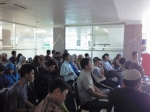Discussing Agro-based Chemical Industry in the 80th anniversary of the Indonesian Chemical Engineering Higher Education
By Adi Permana
Editor Adi Permana

BANDUNG, itb.ac.id-- ITB Chemical Engineering Department and the ITB Chemical Engineering Alumni Association held their 5th webinar to commemorate the 80th anniversary of the Indonesian Chemical Engineering Higher Education (PTTKI). This webinar was held on Saturday (26/06/2021) and presented teaching staff and alumni with their individual success stories.
The first presentation of the material was delivered by a Chemical Engineering lecturer and the Indonesian Bioenergy Experts Association Chairman, Dr. Tatang Hernas Soerawidjaja. He explained the material in the plant-based chemical industry. According to him, there are two natural resources for the chemical industry: mineral and plant natural resources. Organic natural resources are not only derived from natural plant resources but there are also mineral natural resources which are organic natural resources. "Oil, gas, and coal are also organic natural resources because they contain mineral natural resources, such as carbon, oxygen, and hydrogen," he said.
He also said that the energy sector is the "oxygen" of the modern economy, making it essential to maintain the energy supply. However, Indonesia has become a net importer of petroleum since 2004 because the demand doesn't meet our supply. Nevertheless, fortunately, Indonesia is one of the countries with the highest rate of photosynthesis in natural processes, making it an advantage to develop natural resources from plants.
"There are many trees with high fatty acid content in Indonesia. Now we have to think about how to develop it," said Dr. Tatang.
Sahat Sinaga delivered his speech related to the role of palm oil in the industry and the journey of palm oil processing in Indonesia. He is the Chairman of the Indonesian Palm Oil Board and an alumnus of the Chemical Engineering ITB class of 1973. "Many teachings from my former lecturers were very basic and widely used in palm oil processing such as energy balance materials, process flow, and thermodynamics. These things shape our systematic thinking and also strengthen problem solving," he said.
Sahat stated that palm oil could be a savior for Indonesian agriculture because of its abundant availability and high selling value after processing. "We, as palm practitioners, see that the discovery from ITB (Katalis Merah Putih) can be an opportunity for Indonesian oil palm farmers," he said.
Endri Suprianto, S.T, delivered the third presentation related to the oleochemical industry. He is an alumnus of Chemical Engineering ITB class of 1998 who now serves as Director of Manufacturing at PT Unilever Oleochemical Indonesia. "The oleochemical industry is an industry that produces chemicals made from plants and animal raw materials or from nature. This industry is mostly done in Europe, China, and Latin countries. Many oils are made from plants such as soybean," said Endri.
He said that the oleochemical industry in Indonesia has existed since 1979. However, it has not developed much since. However, in 2006 many new plantations were opened, and since then, Indonesia has become the largest producer of palm oil.
In addition, the Director of Marketing Holding Perkebunan Nusantara, Dr. Dwi Sutoro, MBA, explained that Indonesia's plantation areas covered 1,169 thousand hectares, covering several types of crops, namely palm oil, sugar, rubber, cocoa, tobacco, to bioethanol.
Dwi also stated five main stages of processing palm products, "Those are primary produce, harvesting and transport, primary processing, value add processing, and retail," he said. For example, oil palm plants are harvested, and their fruit is taken. Then, the plant is processed into crude oil and kernel oil. Then the next step is processing palm oil into various types of products such as biomass to fuel. This palm oil can also be reprocessed into retail products such as soap and cosmetics.
The last presentation was delivered by Ir. Lies Agustine Wisojodharmo, M.Sc., who now serves as the Main Engineer of BPPT RI. He explained that Indonesia has rubber plantations with a total area of ??3.6 million hectares which is the largest in the world. Meanwhile, this rubber plantation has a productivity of 1,100 kg per year with raw rubber production of 3.7 million tons per year. "It takes an integrated effort in the development and service of technology, information, and certification in the rubber sector, including the formulation of innovation and technology," he stated.
Unfortunately, there is a big problem in the Indonesian rubber industry because the industry is not fully manufactured in Indonesia. BPPT has started to begin processing rubber in Indonesia. "The establishment of the aircraft tire retread industry in Indonesia has been awaited, in addition to increasing Indonesia's natural rubber consumption, this is also useful for saving foreign exchange and also reducing operational costs for the Indonesian aviation industry," said Ir. Lies.
Reporter: Yoel Enrico Meiliano (TPB FTI 2020)
Translator: Billy Akbar Prabowo (Metallurgical Engineering 2020)

.jpg)
.png)
.jpg)
.jpg)
.jpg)


